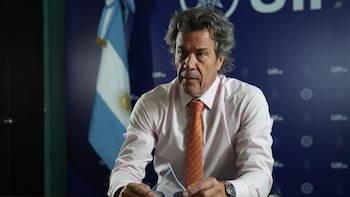
(ATR) Leaders of national Olympic committees affected by the Ebola virus say helping educate their countries is the biggest thing they can do to help.
Leaders from Sierra Leone and Guinea spoke to Around the Rings Saturday in Bangkok to discuss what is being done in their countries and from others to help combat the Ebola outbreak in West Africa.
Requests for comment from the Liberian NOC were not returned.
"Our plan is to be able to sensitize people so that they will create an Ebola-free state," Joseph Nyande, secretary general of the Sierra Leone NOC, said to ATR.
"We are trying to work with Olympic Solidarity so that we can do some radio television programs for athletes and even around the country as a whole. We have to make an impact in trying to eradicate Ebola."
A major sport casualty for the country has been the reappropriation of the under-construction Olympic Africa Center into a hospital.
The center was supposed to be a place for Sierra Leone athletes to train, relax, and receive educational lectures. Due to the outbreak, doctors have taken over the structure to use as a makeshift hospital to help combat Ebola.
Nyande said that he and President Patrick Coker have met with IOC president Thomas Bach to discuss ways the international sports body can help in the disease-stricken country.
Bach said in Bangkok that the IOC would help pledge its support to eradicating Ebola from West Africa.
Nabi Camara, president of the Guinea NOC, said to ATR that Bach only met with leaders from Sierra Leone and was unaware of what the IOC president would do for Guinea personally.
"Thanks to the IOC and ANOCA, there has been a lot of moral support, mainly for the countries that have had the problem to deal with, and that’s a lot," Camara said through a translator.
The situation in Sierra Leone is stabilizing with Nyande saying that the disease has reached a "threshold," and little to no new cases have been reported.
On the other hand, the situation in Guinea is still dire.
"The borders are closed and the economy is not doing well at all," Camara said.
"There have been many deaths and since the general level of education isn’t very high. It's rather difficult to get the information to the people how to behave and what to do. The measures they are taking were taken rather late."
Camara said that he is grateful for the efforts of Doctors Without Borders and the World Health Organization, and that Guinea and Sierra Leone could not have survived this without the help of the international community.
"We were taken by surprise [by the disease]," Camara said.
"[It was]the first time we ever heard about Ebola, and then suddenly one day the virus cropped up in their country. The NOC can’t really do very much; the only thing it can do is help inform people that have contact with it is best to protect themselves so they don’t catch the virus."
Both countries said they cannot track athletes who are entering and leaving the country, but citizens traveling abroad are faced with strict screening processes.
Guinea and Sierra Leone have football teams attempting to qualify for the 2015 Africa Cup of Nations in Morocco. Both squads must play their "home" matches in other countries, with Guinea’s being played in Morocco, and Sierra Leone hosting matches in Ivory Coast.
Organizers have considered postponing the 2015 football tournament, or cancelling it completely due to the outbreak.
The NOC leaders admitted to facing daily screenings in Bangkok, and needing to go through multiple medical checks before they could leave their respective countries.
"Even meetings like this people are afraid and they keep their distance and sport is still being practiced but everyone is afraid," Camara said.
Written by Aaron Bauer
20 Years at #1: Your best source of news about the Olympics is AroundTheRings.com, for subscribers only.
Últimas Noticias
Utah’s Olympic venues an integral part of the equation as Salt Lake City seeks a Winter Games encore
Utah Olympic Legacy Foundation chief of sport development Luke Bodensteiner says there is a “real urgency to make this happen in 2030”. He discusses the mission of the non-profit organization, the legacy from the 2002 Winter Games and future ambitions.

IOC president tells Olympic Movement “we will again have safe and secure Olympic Games” in Beijing
Thomas Bach, in an open letter on Friday, also thanked stakeholders for their “unprecedented” efforts to make Tokyo 2020 a success despite the pandemic.

Boxing’s place in the Olympics remains in peril as IOC still unhappy with the state of AIBA’s reform efforts
The IOC says issues concerning governance, finance, and refereeing and judging must be sorted out to its satisfaction. AIBA says it’s confident that will happen and the federation will be reinstated.

IOC president details Olympic community efforts to get Afghans out of danger after Taliban return to power
Thomas Bach says the Afghanistan NOC remains under IOC recognition, noting that the current leadership was democratically elected in 2019. But he says the IOC will be monitoring what happens in the future. The story had been revealed on August 31 in an article by Miguel Hernandez in Around the Rings

North Korea suspended by IOC for failing to participate in Tokyo though its athletes could still take part in Beijing 2022
Playbooks for Beijing 2022 will ”most likely” be released in October, according to IOC President Thomas Bach.




